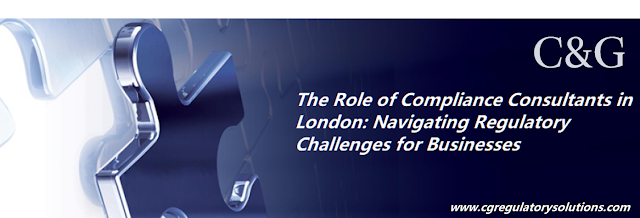The Role of Compliance Consultants in London: Navigating Regulatory Challenges for Businesses
Introduction
In the
ever-evolving landscape of regulatory requirements, businesses in London face
numerous challenges in ensuring compliance with a vast array of laws and
regulations. In this complex environment, compliance consultants have emerged
as indispensable partners for businesses seeking to navigate the intricate web
of regulatory frameworks. This article explores the role of compliance
consultants in London and highlights the value they bring to businesses,
helping them stay ahead of the curve and mitigate regulatory risks.
Understanding the
Regulatory Landscape
London, as a global financial center, is subject to a wide range of regulations spanning multiple sectors. From financial services to data protection, anti-money laundering to environmental compliance, businesses must grapple with an extensive array of regulatory requirements. Compliance consultants in London possess a comprehensive understanding of these regulations, including updates, amendments, and emerging trends, allowing them to provide businesses with accurate guidance and strategic advice.
Customized Compliance
Strategies
One of the
primary roles of compliance consultants is to assess a business's unique
operations, identify applicable regulations, and develop tailored compliance
strategies. They work closely with clients to conduct comprehensive compliance
audits, gap analyses, and risk assessments. Based on the findings, compliance
consultants design and implement compliance programs, policies, and procedures
that align with both legal requirements and the specific needs of the business.
These customized strategies ensure that businesses can meet regulatory
obligations effectively while minimizing disruption to their operations.
Regulatory Change
Management
Regulatory
frameworks are subject to constant change, with new laws and regulations being
introduced and existing ones revised regularly. Compliance consultants play a
crucial role in keeping businesses informed about these changes and assisting
them in adapting to new requirements. They actively monitor regulatory
developments, interpret their implications, and communicate relevant updates to
businesses promptly. Compliance consultants also help organizations assess the
impact of regulatory changes on their operations, enabling them to implement
necessary adjustments efficiently and in a timely manner.
Training and Education
Compliance consultants
provide invaluable training and education to businesses and their employees.
They offer workshops, seminars, and webinars to enhance employees'
understanding of compliance obligations, regulations, and best practices. By
fostering a compliance-focused culture within organizations, consultants
empower employees to proactively identify and address compliance issues.
Furthermore, compliance consultants ensure that businesses are equipped with
the knowledge and skills necessary to maintain compliance in an ever-changing
regulatory environment.
Independent Compliance
Assessments
To ensure
the effectiveness of compliance programs, businesses often engage compliance
consultants to conduct independent assessments and audits. These assessments
provide an unbiased evaluation of a company's compliance measures, identifying
potential weaknesses, gaps, or areas for improvement. The consultants then
offer recommendations to strengthen the compliance framework and mitigate
risks. Independent assessments by compliance consultants also demonstrate a
commitment to regulatory compliance to stakeholders, investors, and regulatory
authorities.
Conclusion
In the face
of mounting regulatory challenges, compliance consultants play a vital role in
helping businesses in London maintain compliance, manage risks, and adapt to
changing regulatory landscapes. Their expertise, knowledge, and customized
approaches enable businesses to navigate the complexities of regulations
effectively. By engaging compliance consultants, organizations can focus on
their core operations while having the assurance that their compliance
requirements are met, ensuring long-term success in a highly regulated business
environment.




Comments
Post a Comment